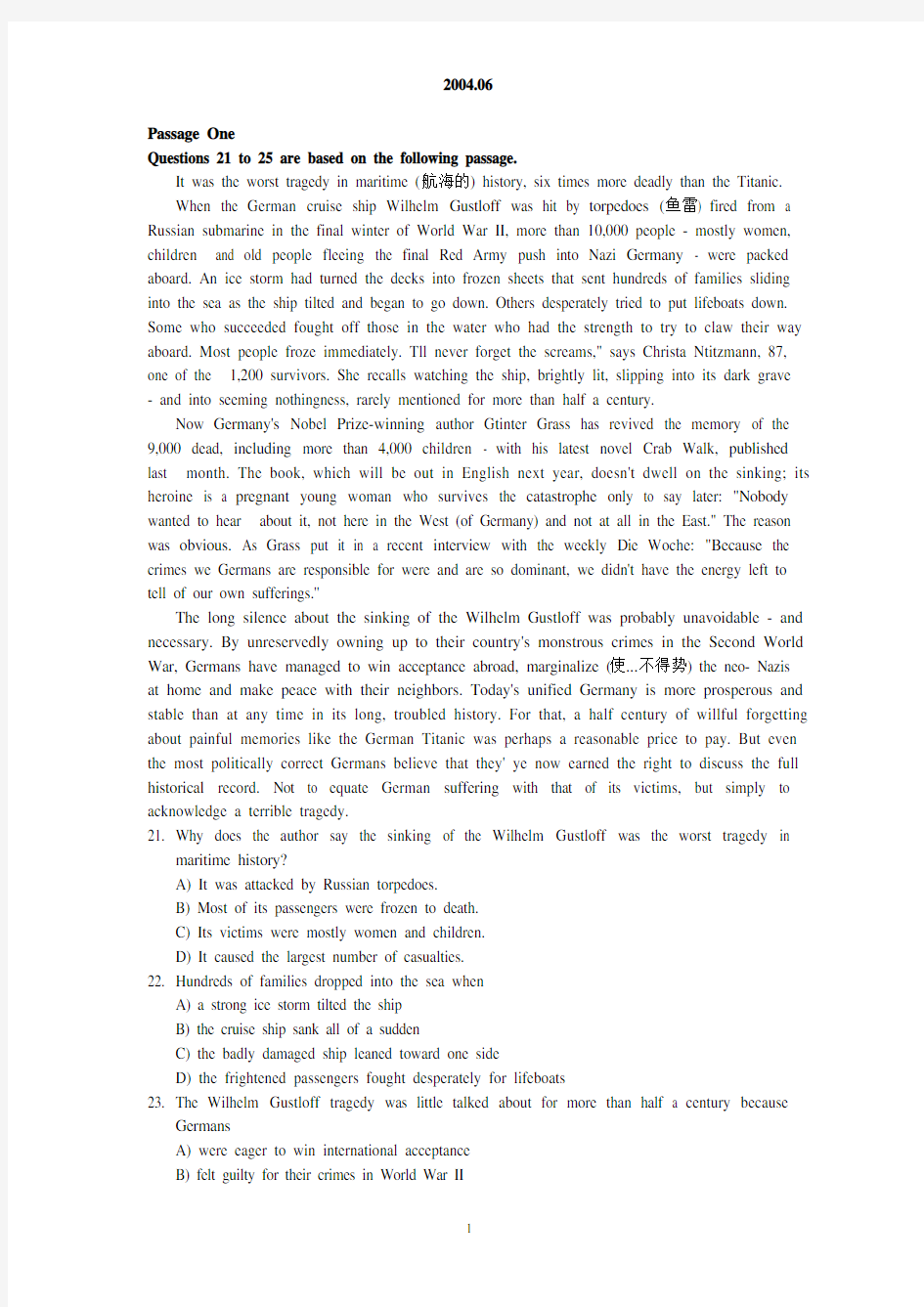英语六级真题含答案

- 1、下载文档前请自行甄别文档内容的完整性,平台不提供额外的编辑、内容补充、找答案等附加服务。
- 2、"仅部分预览"的文档,不可在线预览部分如存在完整性等问题,可反馈申请退款(可完整预览的文档不适用该条件!)。
- 3、如文档侵犯您的权益,请联系客服反馈,我们会尽快为您处理(人工客服工作时间:9:00-18:30)。
Passage One
Questions 21 to 25 are based on the following passage.
It was the worst tragedy in maritime (航海的) history, six times more deadly than the Titanic.
When the German cruise ship Wilhelm Gustloff was hit by torpedoes (鱼雷) fired from a Russian submarine in the final winter of World War II, more than 10,000 people - mostly women, children and old people fleeing the final Red Army push into Nazi Germany - were packed aboard. An ice storm had turned the decks into frozen sheets that sent hundreds of families sliding into the sea as the ship tilted and began to go down. Others desperately tried to put lifeboats down. Some who succeeded fought off those in the water who had the strength to try to claw their way aboard. Most people froze immediately. Tll never forget the screams," says Christa Ntitzmann, 87, one of the 1,200 survivors. She recalls watching the ship, brightly lit, slipping into its dark grave - and into seeming nothingness, rarely mentioned for more than half a century.
Now Germany's Nobel Prize-winning author Gtinter Grass has revived the memory of the 9,000 dead, including more than 4,000 children - with his latest novel Crab Walk, published last month. The book, which will be out in English next year, doesn't dwell on the sinking; its heroine is a pregnant young woman who survives the catastrophe only to say later: "Nobody wanted to hear about it, not here in the West (of Germany) and not at all in the East." The reason was obvious. As Grass put it in a recent interview with the weekly Die Woche: "Because the crimes we Germans are responsible for were and are so dominant, we didn't have the energy left to tell of our own sufferings.''
The long silence about the sinking of the Wilhelm Gustloff was probably unavoidable - and necessary. By unreservedly owning up to their country's monstrous crimes in the Second World War, Germans have managed to win acceptance abroad, marginalize (使...不得势) the neo- Nazis at home and make peace with their neighbors. Today's unified Germany is more prosperous and stable than at any time in its long, troubled history. For that, a half century of willful forgetting about painful memories like the German Titanic was perhaps a reasonable price to pay. But even the most politically correct Germans believe that they' ye now earned the right to discuss the full historical record. Not to equate German suffering with that of its victims, but simply to acknowledge a terrible tragedy.
21. Why does the author say the sinking of the Wilhelm Gustloff was the worst tragedy in
maritime history?
A) It was attacked by Russian torpedoes.
B) Most of its passengers were frozen to death.
C) Its victims were mostly women and children.
D) It caused the largest number of casualties.
22. Hundreds of families dropped into the sea when
A) a strong ice storm tilted the ship
B) the cruise ship sank all of a sudden
C) the badly damaged ship leaned toward one side
D) the frightened passengers fought desperately for lifeboats
23. The Wilhelm Gustloff tragedy was little talked about for more than half a century because
Germans
A) were eager to win international acceptance
B) felt guilty for their crimes in World War II
